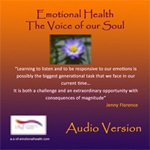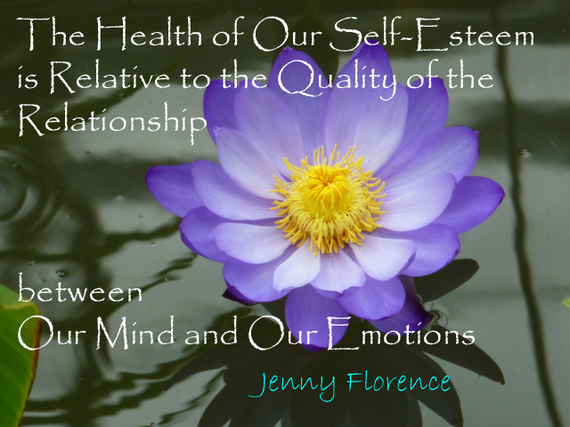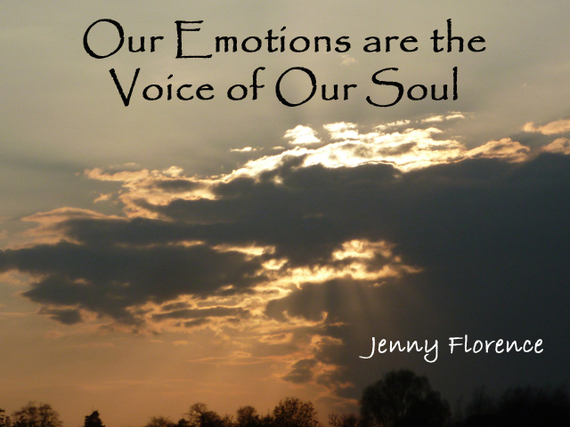
Self-esteem is a reflection of our true inner sense of well-being and our deepest inner sense of self value. It is a picture of the way that we feel about ourselves. A picture of our self-worth, our self-regard and our self-respect and a reflection of our ability to live in a manner that is aligned with our deepest inner needs and of our ability to be emotionally responsive to the core of our well-being.
Our self-esteem is a reflection of the health and wellness of our soul.
8 Keys to Healthy Self-Esteem
1. Relational Living... Human beings are 100 percent relational. We live in a continuous state of relating. There is always a relationship between our inner world and our outer world; a continual energetic exchange that takes place between our inner and outer experiences. The external circumstances that we draw to ourselves are a reflection of our internal state of experience. And it isn't simply our state of mind that dictates this... it's our emotions that color and influence this energetic exchange.
2. Relationship... The health of our self-esteem is relative to the quality of the relationship between our mind and our emotions. Our external relationships and the way that we engage and navigate our world will act as a mirror of this internal relationship and our external actions and the way that we live our lives will have a direct impact on our self-esteem and on our core inner beliefs. The manner in which we live will either be feeding and fueling our self-esteem, or it will be depleting it.
3. Emotional Language. Our emotions are continually informing us. They are our navigational system, and they're giving us information. Our emotions are the absolute expression of relatedness and of relationship; they give voice to the exchange of everything that is taking place in our pure and real experience.
We need to develop a fluent emotional communication with ourselves to enable us to listen to our deepest inner knowing. How we hear and interpret what is being communicated and how we respond to ourselves will determine whether or not our deepest inner sense of self, our self-esteem, our soul, will flourish... or whether it will be stifled and shut down.
4. Choice... We have a choice. We can learn to listen and we can learn to hear and we can learn to respond. As adults, to live well and to thrive we need to take conscious responsibility for our inner well-being and develop our ability to live from a position of co-creativity in which we are actively and relationally engaged in every aspect of our lives, a position where we are actively engaged in choice. Alternatively, we can avoid choice. When we invest energy in creating structures that allow us to perceive ourselves as victims to life, we can actively avoid a position of self-responsibility.
5. Self-responsibility... "Response" - "ability" is a mixture of responsiveness and accountability. Self-responsibility is literally being responsive to our self with accountability to our self. We can grow into and take ownership of a position of self-responsibility and in doing so learn to live in harmony with our own inner voice. We can be responsive to our deepest needs and learn to live in harmony with our soul. When we defend against a position of self-responsibility, we also defend against a position of thriving autonomy.
6. Honor... Honor is right at the core of "good or healthy" self-esteem.
In any situation that is challenging or difficult, the people that come out on top are those that come out feeling good about their actions and good about themselves. In fact regardless of the outcome, when we know that we have responded with decency and honor, our inner sense of well-being remains intact and our self-esteem becomes strengthened.
When we live honorably we are fueling and feeding the growth of our self-esteem. Likewise when we do not live honorably then at a very core level of experience we are depleting our self-esteem. Honor is food for the soul.
7. Courage... Too many of us have been brought up to perceive certain emotions as a weakness. In my experience it takes profound courage to look at our deepest and most challenging feelings. It takes profound courage to consider quietening and stilling our mind for long enough to reflect upon the way that we actually feel. It takes profound courage to bear the intensity of difficult and sometimes painful feelings and to develop a relationship with these emotions. When we shut down our feelings we shut down our inner voice. We shut down the voice of our soul, and we defend against life itself.
8. Vulnerability... When we have learned to defend against any form of vulnerability, we are unable to access the full range of our emotions. When we are unable to listen to ourselves, we are unable to be responsive to the deepest inner parts of ourselves -- to our psyche, to our self-esteem and to our soul.
When we can stand in our vulnerability with honesty and with humility, it is a strength beyond measure.
Jenny Florence enjoys conversation with her readers.
Log on to her website, a-z-of-emotionalhealth.com to listen to Audio Talks about all aspects of Emotional Health.
Her new audio book, Emotional Health, the Voice of Our Soul, is now available on Amazon. It is also available in Kindle.

